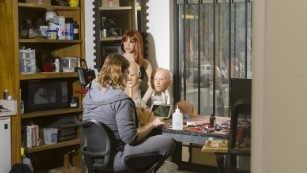(CNN) In HBO’s series “Westworld,” humans pay for sex with robots in an anything-goes Wild West-inspired theme park. In the movie “Her,” a man falls in love with his Siri-like operating system. And in AMC’s show “Humans,” a husband has an affair with his pretty robotic assistant.
It’s the stuff of science fiction. But could a world in which robots are at our sexual beck and call be nearer than we think? What would that mean for humanity and for our sex lives?
Most experts agree that we’re at least decades away from a true “Westworld” scenario. We just don’t have the technology to create robots that can function as realistic sex partners, but we may be getting closer.
For instance, new interactive toys can be controlled from afar and, when combined with virtual reality programs, allow users the experience of having digitized “sex” with a porn star or other sex worker, said sex therapist Ari Tuckman.
Although still in the early stages, manufacturers of life-size sex dolls are experimenting with technology that would imbue them with artificial intelligence. The emerging field of claytronics may someday allow users to program 3-D objects, perhaps including humanoid representations that could be used for sex, among other things, according to Carnegie Mellon University computer engineering professor Seth Goldstein.
As a sex therapist, I’m also intrigued by the ways in which robotics might transform human sexuality. Along with engineering challenges, sex robots raise a number of ethical and philosophical concerns for individuals, couples and therapists. Here are just some of the facets of future sex that my colleagues and I are pondering.
Who might benefit from sex robots?
The hypothetical applications of sex robots and related products, part of a field called technosexuality, seem endless. I could see couples using them to enact fantasies, such as a threesome, that they might not feel comfortable trying with real people.
If one partner has a higher libido, a robot could allow him or her to enjoy a fulfilling sex life without straying. And robots might help couples break out of sex ruts by adding spice to their relationship or maintaining long-distance romances.
“I think a huge benefit of using technology and design to develop sex devices is that they open up new forms of sexual experience, ways to experience intimacy with others, to feel good in our own skin, to have mind-blowing orgasms, all of it,” said Shaowen Bardzell, associate professor of informatics at Indiana University.
“Robots could also be useful for virgins or for people with social anxiety who wish to gain practice before actually having sex with a partner,” sex therapist Holly Richmond said.
They also show promise for people who have mental or physical disabilities that may impede their ability to find sexual partners, those who live in rural areas or are socially isolated, and anyone who can’t or doesn’t want to connect with others in an intimate way.
“Technosexuality could potentially open up sexual experiences to everyone,” Tuckman said. “Even people who seemingly have limited options.”
How could robots help sex therapists?
Likewise, robots and related technologies could offer real benefits to those of us working to help people tackle sexual concerns.
“There could certainly be a role for technosexuality as surrogates in treating men with premature ejaculation or erectile disorders, particularly those without human partners,” said sex therapist Ron Feintech.
Ideally, robots would be an extension of therapists used in conjunction with professional guidance rather than in place of it.
Is there a dark side to sex robots?
Anyone who’s watched the first 10 minutes of “Westworld” can see the potential downside of sex robots. People might use robots to act out their darker fantasies like rape, pedophilia and violent sex.
But is that necessarily a problem? If we channel our taboo desires through robots, are we feeding the urge or achieving some sort of safer catharsis? Only time will tell.
Does sex with a robot constitute cheating?
Though there’s much about technosexuality that’s still unknown, it’s clear that such advances will undoubtedly impact monogamy: Couples will need to reassess how they define infidelity. Some will probably view sex with a robot as a threat to their relationship, while others will see it as a fun addition.
“If you haven’t discussed it with your partner,” sex therapist Heather McPherson said, “it’s cheating.”
One thing is certain: Just as we’ve had to adjust our relationships to address strip clubs, social media and Internet porn, couples will need to have honest conversations about how to navigate this brave new world together.
By Ian Kerner
Dec. 1, 2016








